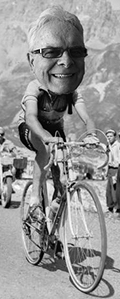Six short memories from across the years
 Mon, August 22, 2022
Mon, August 22, 2022 1.) As a child during the 1940s I lived in a house in England with no electricity and no water piped into the house. Water was brought in by bucket from a communal well outside. Lighting was by oil lamp and candles. My mother cooked with a coal fired range and baked wonderful pies and cakes. She did so without a thermometer on the oven.
She ironed with a flat iron also heated on the stovetop. She would spit on the iron to test the temperature, the spit would boil and run off immediately if it was hot enough. She had a pair of flat irons, one would be heating while she ironed with the other for a minute or so before it cooled.
2. It was early 1946 in England; WWII had been over less than a year. I was ten years old. King George VI, father of Queen Elizabeth was coming through our town on his way somewhere else. In the days leading up to this event, we made paper flags at school
Whether real flags were not available, or the school was too cheap to buy us flags, I don’t know. But we each drew and colored a British flag on both sides of a piece of paper and then glued it to a stick.
The day finally came, and we all lined up at the roadside. We waited, and we waited, freezing our little asses off, for at least an hour. Finally, here came the motorcade, passing through at about 45 mph. We all started cheering and waiving our little paper flags.
Someone shouted, “There he is” and pointed. I think I saw King George VI that day, I can’t be certain, but I think I did.
3.) As an eighteen-year-old in 1954, walking home in the early hours of a Sunday morning, after a Saturday night out, when an older drunk man, probably in his forties, tried to pick a fight with me. He took a swing at me but missed and fell over. I carried on walking home but heard a tremendous crash as he had fallen backward through the plate glass window of a television shop. The noise was deafening as the sound amplified through the empty streets. The last I saw of the drunk, he was lying on his back amongst the TV sets, with his legs in the air.
I took off running, and was chased by two American Military Police, in a Jeep. They pulled alongside me, and when they saw I was not an American Serviceman, they stopped and gave up the chase. I made it home without further incident. Later the local newspaper told the story of a broken store window mystery, and that nothing was stolen. There was no mention of the drunk guy. I guess he was not seriously hurt and had left the scene.
There was a large American Air Force Base, near where I lived. The Military Police would patrol the streets but had no jurisdiction over civilians. We called them "Snow Drops" because they wore white helmets, reminding us of a British wild flower that has white bell shaped petals and is called a Snow Drop.
4.) In 1968 (Age 32.) I saw Jimi Hendrix play in Nottingham, England, At the time he was still relatively unknown in America. The show was in a small venue and was the loudest concert I have ever been to. He had Marshall speakers stacked floor to ceiling. I stood at the back of the room and the sound was actually pushing my chest in. I don’t believe it was by chance his band was called “The Jimi Hendrix Experience.”
5.) In the mid 1980s the owner of a bike store in Denver asked me if I would make an exception for a very special customer and personally measure him for a custom frame. The customer was the manager of the Denver Broncos football team. (I don’t recall his name.) The team was coming to San Diego to play the Chargers and after the game he would drive up to see me.
The outcome was, the Chargers beat the Broncos, and the team and the manager took an early flight home. (Obviously, sore losers.) I never did get to measure him or build him a frame. Had I done so I would probably remember his name.
 6.) In the late 1980s I was approached by Fila, the sports clothing company. They were interested in a line of bicycles with the Fila name on them. Two people from the company came to my shop to look at my operation, and we talked about my building these frames. They must have dropped the idea, I never heard back, and I don't recall anyone else making a Fila bike.
6.) In the late 1980s I was approached by Fila, the sports clothing company. They were interested in a line of bicycles with the Fila name on them. Two people from the company came to my shop to look at my operation, and we talked about my building these frames. They must have dropped the idea, I never heard back, and I don't recall anyone else making a Fila bike.



















A summary of the two Tour de France races
I missed posting here last week for the first time in a long time. The reason, I got wrapped up in the Tour de France. First the men’s race, one of the best I had seen in recent years. Followed by the women’s race.
In the men’s race it was good to see that Tadej Pogacar was indeed human, and could be beat, although I can’t help feeling that Jonas Vengegaard was not greatly superior to Pohacar, rather equal, but having a stronger team.
Anyway, it was refreshing to see the respect these two young riders had for each other and it brought me back to what the sport used to be, as I remember it years ago.
I didn’t know what to expect in the Tour de France Femmes, but from the first stage on, I was hooked. Shorter stages meant that tactically the race played out quicker and was extremely entertaining and exciting to watch.
In the flat sprinter’s stages for example, there was none of the holding the break at two or three minutes for the entire race, until the last 10 kilometers.
Because the stages were shorter, breaks were brought back quickly, often followed by more attempts to break clear. This fast, attacking style of racing, over a shorter distance was not only exiting to watch, but it also meant by the end of the stage the peloton had split into smaller groups.
The result being, only the strongest riders contested the sprint, instead of the chaotic entire field, bunch sprint that has become all too common on the flat stages of the men’s races.
As for the final two mountain stages, Annemiek van Vleuten just dominated the entire race, winning both stages and the Overall Classification. It was a joy to watch her climbing ability.
It was great to see the support of fans by the roadside, especially as they had been exposed to three weeks of the men’s race. Apparently, the TV coverage was also watched by more viewers world-wide.
I can only imagine that having a Women’s Tour de France, will create an increased interest in the sport, by people who would otherwise not usually watch.
This can only be a good thing for the sport in general and perhaps create a way forward from the somewhat tarnished image that unfortunately the sport has created for itself over the years.